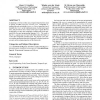Free Online Productivity Tools
i2Speak
i2Symbol
i2OCR
iTex2Img
iWeb2Print
iWeb2Shot
i2Type
iPdf2Split
iPdf2Merge
i2Bopomofo
i2Arabic
i2Style
i2Image
i2PDF
iLatex2Rtf
Sci2ools
120
click to vote
ATAL
2009
Springer
2009
Springer
Agent programming with temporally extended goals
In planning as well as in other areas, temporal logic has been used to specify so-called temporally extended goals. Temporally extended goals refer to desirable sequences of states instead of a set of desirable final states as the traditional notion of achievement goal does, and provide for more variety in the types of goals allowed. In this paper, we show how temporally extended goals can be integrated into the agent programming language GOAL. The result is that GOAL agents may now have both beliefs about the future as well as have temporally extended goals. We propose a new decision making mechanism that takes temporally extended goals into account, and investigate properties of this framework. Categories and Subject Descriptors I.2.11 [Artificial Intelligence]: Distributed Artificial Intelligence— Intelligent agents, languages and structures; I.2.5 [Artificial Intelligence]: Programming Languages and Software General Terms Theory, Languages Keywords Agent Programming, Goals, ...
Related Content
| Added | 26 May 2010 |
| Updated | 26 May 2010 |
| Type | Conference |
| Year | 2009 |
| Where | ATAL |
| Authors | Koen V. Hindriks, Wiebe van der Hoek, M. Birna van Riemsdijk |
Comments (0)

